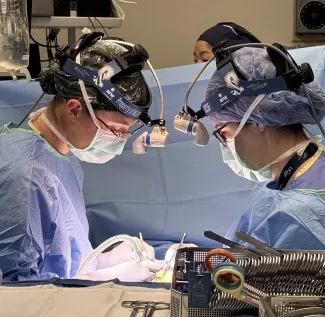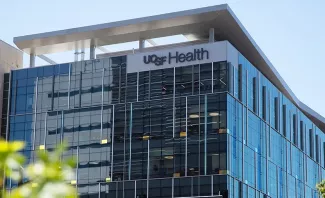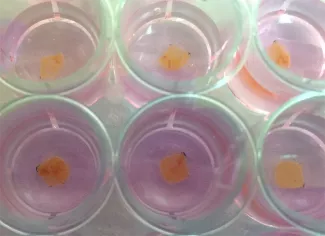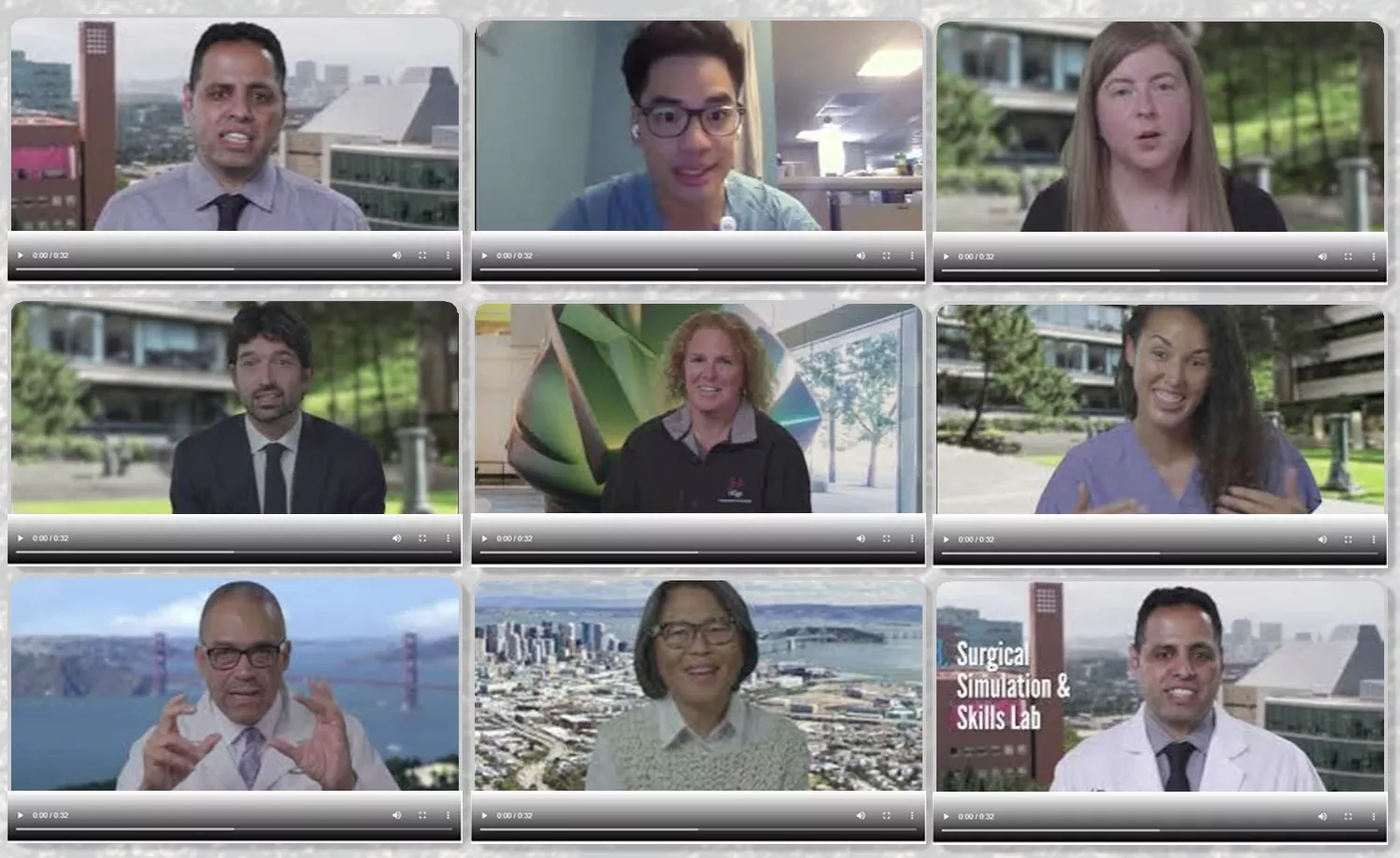General Surgery Residency Program

The UCSF General Surgery Residency Training Program
Mission
The mission of the UCSF general surgery residency is to educate and train future leaders of surgery, who meet the highest standards of clinical excellence, ethics, and professionalism, are committed to scholarly work and advancing surgical knowledge, and who contribute to the education and mentorship of subsequent generations of surgeons.
A graduate of this program should have the foundation to:
Provide compassionate, outstanding surgical care to patients.
Advance the field of surgery through investigative and scholarly work.
Assume leadership roles in academic departments, healthcare systems, or national organizations.
Educate and mentor future generations.

New for the 2025-26 application cycle: prior to the 2025-26 application cycle, the UCSF General Surgery Residency had one 7-year track, which included 5 clinical years and 2 professional development/research years. For the 2025-26 application season (matching residents who would begin in academic year 2026-27), we will offer a new track that will allow for completion of training in 5 years, with the opportunity to participate in creative or scholarly activity during clinical time. This will be a separate track to which candidates may apply and rank separately from our 7-year track.
7-Year Track
Residents in the 7-year pathway will complete 3 years of clinical training, then transition to 2 years of professional development/research, followed by years 4 and 5 of the clinical training program. Residents in this pathway will be expected to identify a faculty mentor by the middle of PGY2 year, develop a strategy for funding (with guidance, advocacy, and support from the faculty mentor and others), plan, and execute a scholarly project during the two years of dedicated time. This track will match six of the eight categorical general surgery residents.
5-Year Track
Residents in the 5-year pathway will complete the 5 years of clinical training without dedicated research years but will have focused opportunities for professional development and scholarly activity during the clinical years. These opportunities will include: dedicated rotations focused on scholarship, more flexibility in rotation scheduling to accommodate specific clinical interests during the PGY3, 4, and 5 years, and departmental support for professional development activity during clinical time. This track will match two of the eight categorical general surgery residents.
The introduction of the new 5-year pathway was driven by the changing landscape of surgical training and academic surgery, the evolving interests of current and future residents, and a desire to cater training pathways to the specific needs and goals of our residents. This change is also reflective of the diversification of academic surgery in general, with many pathways in academia distinct from the traditional NIH-funded route.

UCSF is the only general surgery residency program within the city of San Francisco. As a result, our residents have an exceptionally robust breadth and depth of clinical experiences. The clinical sites include:
UCSF Health: a comprehensive health care network based in San Francisco with multiple sites in and around the San Francisco Bay Area. The UCSF Health sites at which our residents rotate include:
- UCSF Health Parnassus Heights Medical Center: a 600-bed inpatient facility, caring for a complex, high-acuity patient population. Surgical rotations at this site include Kidney Transplant, Liver Transplant, Vascular Surgery, MIS/Bariatric surgery, Acute Care Surgery, Complex General Surgery, Surgical Intensive Care
- UCSF Health Mission Bay: a 290-bed campus that includes the Benioff Children’s Hospital and the USCF Bakar Cancer Center Hospital, part of the UCSF Comprehensive Cancer Center. Rotations at this site include: Pediatric Surgery, Hepatopancreaticobiliary/oncologic surgery, Colorectal Surgery, and Breast surgery.
- UCSF Health Mt. Zion: a primarily outpatient facility with a small inpatient unit and short stay unit. The Endocrine surgical service is based at Mt. Zion, although some of the endocrine surgeons operate at the Parnassus Campus as well.
Zuckerberg San Francisco General Hospital: a 400-bed public, safety-net hospital whose mission is to provide care to the residents of the city of San Francisco, regardless of ability to pay or immigration status. It is the city’s only Level 1 Trauma Center and is a part of the SF Department of Public Health Network. Surgical rotations at this site include the Trauma/General Surgery service, Surgical Intensive Care, Neurosurgery (as PGY1), and Gastroenterology
Kaiser San Francisco Hospital: a 240-bed inpatient facility in the Kaiser Permanente integrated health care system. Residents rotating on the surgical service at Kaiser experience a broad range of general and vascular surgical patients within the Kaiser system.
California Pacific Medical Center: part of the Sutter Health Hospital system, CPMC has three inpatient facilities in the city of San Francisco, the largest being the 275-bed Van Ness Campus (opened in 2019). Our residents work with a busy private-practice general/colorectal surgery group but also have the opportunity to scrub with a broad range of surgeons, including those in thoracic, vascular, and transplant surgery.
San Francisco VA Medical Center: part of the federal Veterans Health Administration network, the SFVAMC has separate general and vascular surgery services through which surgical residents rotate. Residents play a critical role in the care of patients on these services, working with faculty who all have academic appointments at UCSF.

Regardless of training pathway, our mission is to train residents who will go on to move the field of surgery forward and take leadership roles. We also promote an environment where the status quo is questioned, and scientific inquiry and innovation are valued. In order to achieve these goals, we expect all residents to participate in some form of creative or scholarly activity during their time at UCSF.
We have many faculty who are experts and leaders in their field and who are eager to mentor and teach surgical residents. Whether your interests are in basic/translational science, health services research, education, global health, or innovation, we have faculty, resources, and expertise that can help mentor and guide you through this process. Whether you spend dedicated research years, or have a more limited time window to participate, there are many avenues to pursuing creative or scholarly activity at UCSF.

San Francisco is one of the world’s great cities: a diverse, urban environment with incredible parks (Golden Gate Park, Presidio, McLaren Park), world-class dining (from humble hole-in-the wall places to 3-star Michelin restaurants), vibrant culture (museums, galleries, theater, music), and endless opportunities for outdoor activities (running, cycling, surfing, swimming, climbing, hiking). When you include the greater Bay Area and Northern California, the list of places to explore are endless: Marin County, the East Bay, Silicon Valley, Napa/Sonoma, Lake Tahoe, Yosemite, Pt. Reyes, Big Sur, King’s Canyon, Pinnacles—the list goes on. Life as a surgical resident is certainly busy, but there are many opportunities to explore all that San Francisco and the Bay Area have to offer. The weather is quite temperate—you won’t need anything heavier than a fleece or a light puffer, and you will (almost) never need air conditioning in your apartment. For those who have lived in the Bay Area for any length of time, it is hard to imagine living anywhere else.
Thank you for your interest in our training program. For more information, please feel free to explore the following links.
UCSF GME Information for Prospective Residents
Residents share their unique experiences of what it's like to be a general surgery resident at UCSF and the SF Bay Area with its unique multicultural surroundings!
Take a virtual visit to UCSF's general surgery residency program in videos presented by our faculty.

